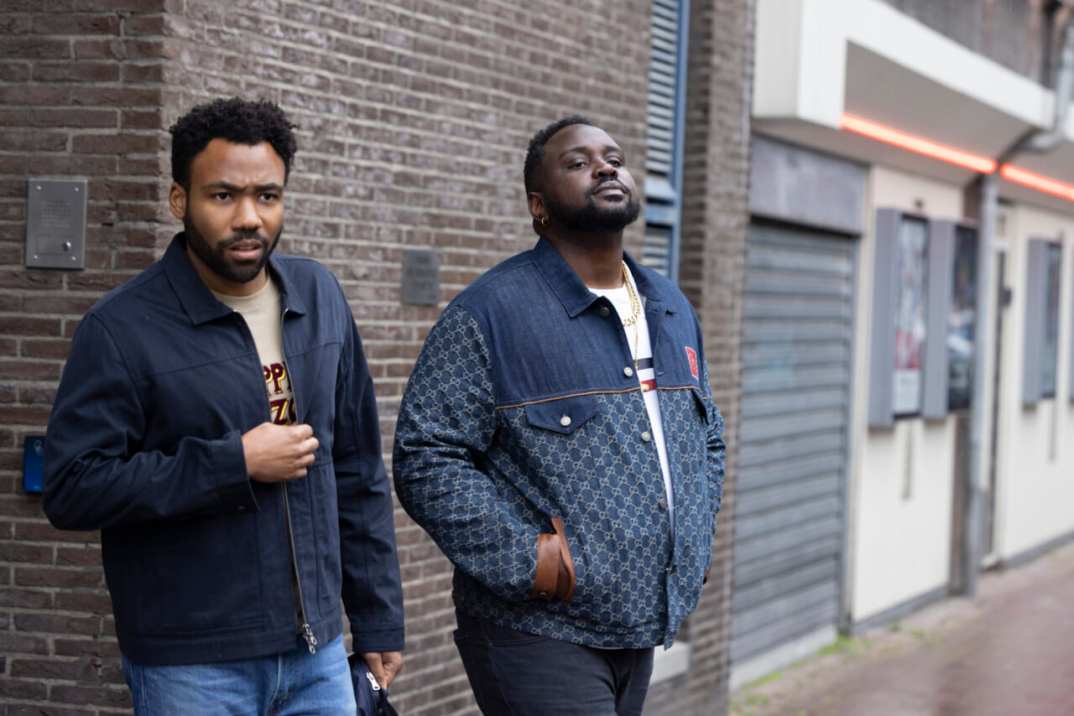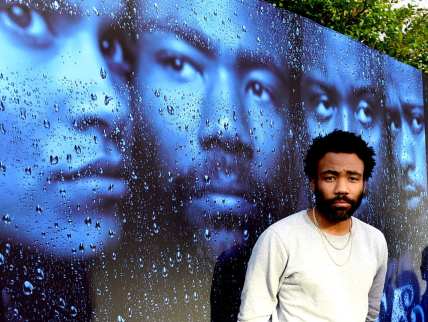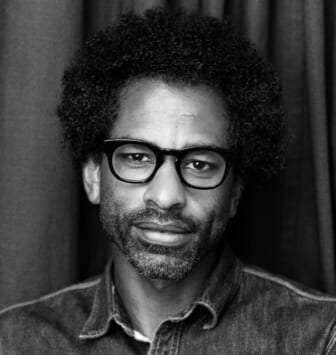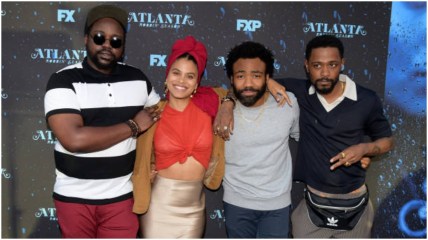‘Atlanta’: New season, new location and as bizarre and brilliant as ever
OPINION: The best show on TV is back with two great episodes. Donald Glover and crew haven’t lost a step.

Editor’s note: The following article is an op-ed, and the views expressed are the author’s own. Read more opinions on theGrio.
The best show on TV is back with an episode that’s bizarre even by Atlanta standards. We’ve got strange dreams, a semi-kidnapped Black boy, a strange, homicidal super woke lesbian couple and none of the Atlanta characters anywhere in sight for the first 99 percent of season 3’s first episode. The description says “We waited 50 years for this?” Tell me about it. What’s going on? I’m gonna try to figure it out. This essay is the first in a series diving into themes and notes from each episode of Atlanta’s third season. I hope after you watch each episode, you’ll continue the conversation by checking in here to see what I found.
In episode one, “Three Slaps,” I kept wondering—am I watching Atlanta? Did I somehow push the wrong button and wander into the wrong show? Where are Earn, Paper Boi, Van and Darius? What does this have to do with them, and where is anything that indicates that this is my show? I felt disoriented and struggled to understand what the narrative had to do with anything about the crew’s adventures in Europe.
Then it hit me—disorientation is the point for at least two reasons. One, it’s a massive flex. Atlanta is so good and so beloved that we’ll watch anything they put out—they no longer have to prove themselves to us. It’s at the point where we, the audience, have to prove ourselves to them, like, can we hang with whatever weirdo creative things Donald Glover and his team want to do? If Atlanta were a rap group, this third season would be like their middle-age album where they start experimenting with weird sounds and daring us to not like it. They know we will.

‘Atlanta’ on FX to end with season 4
But there’s another point to the disorientation of episode one. This is a season about traveling through Europe, and when you move from country to country, it can be extremely disorienting. You can lose your sense of time. The different foods, languages and customs can throw you off. The disorientating nature of the first episode prepares us for experiencing that feeling throughout this entire season as the gang moves through Europe.
The episode also gives us a whole slavery analogy. The main character is Loquareeous, a preteen boy who is pushed out of his home where he lives with his Black biological mother (for him, in this analogy, his home is Africa) and sent to live with two white, lesbian women (America). These two women are the epitome of the terrible white allies out to save Black people. They have three other adopted Black children and a pathetic little dog named “Corn Pop,” which is, of course, the name of the Black gang member that Joe Biden once faced down with a chain (Corn Pop had a razor).
These two women are peak, hyper woke, gross liberals, and the three Black kids they’ve already adopted never speak, which makes it seem like the couple has already snatched their souls or taken their will to live or something. Loquareeous is immediately renamed Larry, stripping him of his unique African name for a plain European one. Why not just call him Toby? Would that have been too on the nose?
By this point, I’m at home yelling “What is this, ’12 Days a Slave’?!?” And then, in the very next scene, the four kids are dutifully working in the field—I mean, the garden—while the white moms sit by…overseeing. When Loquareeous complains, one of the moms tells him to pass the time by singing. She suggests he sing a sad blues song.
When the family goes off to the farmer’s market, Loquareeous tries to escape by running to a police officer, but the officer quickly returns him to his white moms, recalling both the American police’s roots as slavecatchers whose job was to return runaway slaves and the devilishly disarming power of the white female smile. As soon as the moms show the cop their teeth and cheeks, he decides that they’re nice ladies who must be telling the truth, and his curiosity ends. Can we get Harriet Tubman to save these kids? Well, a Black woman arrives to try to help the kids, but one of the moms murders her, filling us with dread. When the couple drives off the cliff, attempting to murder themselves and the kids, it all recalls the two white lesbian moms who adopted six Black kids, abused them and then killed them.

So I’m getting slavery, I’m getting disorientation, I’m getting the treachery of white over-wokeness, I’m getting Black kids escaping white captors, and then suddenly Earn wakes up in a lovely hotel room. Was it all a remembrance of part of his youth or was it all his dream? The show doesn’t make it clear, but I’m guessing it’s a dream because the episode began with a bizarre dream that I can’t even deal with. I don’t know why or how Loquareeous would be dreaming that unless he’s reading Frantz Fanon in his spare time.
As we end with Earn moving slowly and aimlessly through a hotel room, I’m left going, that’s it? And what was that? I’m not quite sure. But it’s Atlanta, and we expect bizarre along with intelligence, epic subtlety, peak Blackness, the willingness to risk going over our heads, and the audacity to be as badass as they want. So even though I’m a little confused and very disturbed—I mean, those white women wanted to murder those Black kids—I’m still like, yo, it’s Atlanta. I want more.
A few things I loved:
- The kids speaking in full sentences through looks…brilliant.
- The mom “fries” the chicken in the microwave. Is that even possible? Like would it even qualify as fried? I know that’s the point but damn. Her chicken is the most struggle chicken ever—it looks pathetic on that plate with a little ringlet of chicken blood beside it. I was screaming “Boy, don’t eat that!”
- Starting with a dream is a screenwriting taboo, but Atlanta breaks rules and still wins.
- When Loquareeous is at the market wearing a sign that says “Free Hugs,” and some white man says, “Is Hugs your father?” I almost died.
In episode two, “Sinterklass Is Coming to Town,” we catch up with the crew, and now I’m clear that yes, I’m watching the right show. But they’re in Amsterdam, so I still feel a sense of disorientation because Atlanta the city has always been a character in Atlanta the show so what is Atlanta the show without the Black mecca? Well, for one, it’s a show where racism smacks them in the proverbial face, but we’ll get to that.
Earn wakes up late having lost his belt and underwear, leading to a hysterical moment at the airport, which evokes the pathetic security theater we all get at the airport. I mean, wanding a naked man? But, despite all of that, it’s clear that he has become a truly professional manager—he’s able to handle anything. Even losing his belt and underwear. He’s grown up, careerwise at least. This is made clear toward the end of the episode when he’s the one who’s calmly evading an angry promoter as opposed to the first season when we saw a frustrated Earn being calmly evaded by a slick promoter. (I love that moment where he disappeared behind a secret revolving door.)
Now Earn knows how to rock the game—we saw his graduation moment at the end of season 2, when he passed off the gun at the airport, saving himself and his crew. Now he’s able to handle anything. $20,000 pronto? No problem. Get you out of jail? No problem. Cancel the show? No problem. Three hundred fried chicken legs right now? Whatever Paper Boi wants, Earn can make it happen. And Paper Boi needs a lot.
Van flies in last, bringing with her what may be the most interesting storyline of all: She’s at a crossroads in her life and searching for who she wants to be. She’s thrifting with Darius and trying on clothes, which can often feel like trying on new selves. When she finds a note with an address inside a coat, she’s game to follow wherever it leads because she’s already in an exploratory mode. She ends up at a death ceremony where she tells the death doula, “I don’t know where I’m supposed to be.” It’s the thesis for her character right now.
Darius, however, is exactly where he’s supposed to be. He’s always been the most out-there stoner boho philosopher of the crew and being in Europe has led him to drift further into cultural outer space. His bleached blonde hair, boldly colorful clothes, clogs and pronouncements—“This city is my Jesus”—indicate someone who’s only become more free in Europe. This, to me, recalls Richard Wright and James Baldwin going to Europe to be their true selves away from the constant specter of American racism. Of course, racism finds them in Amsterdam, too.

Paper Boi seems to have changed less than the other characters, if at all. He’s just moved his game across the pond. The moment he’s introduced is a classic Atlanta move—a misdirection that’s both hysterical and tragic. We know he’s in jail, and we see him in a tight shot wearing jail khakis while sitting on a jail bed. He’s staring at a piece of paper and says, “Y’all charging me for this shit?” I thought, OK, he’s questioning what the police are charging him with, setting us up for a battle with the local justice system because wherever Black people go, we’re at war with the man who is charging us with some BS. But no. Not at all. He’s looking at a menu. He’s asking if they’ll charge him for the food he’s about to order. They won’t. And the cop taking his order is extremely nice. The scene ends with Paper Boi starting a tasty nap while awaiting his food. He’s free to go but he’d rather stay and eat. Is this jail or a hotel? Also, he says the fabric softener is amazing. Contrast this jail scene with Earn in jail in season 1 and you know we’re in another world, which is further confirmed the moment Paper Boi gets out.
After his release, as Paper Boi and Earn move through the city, they encounter a baby in blackface and then an adult in blackface and then more and more people in blackface. Even though the people seem pleasant and nonthreatening, to Black eyes, they’re totally triggering. The character they’re evoking is Zwarte Piet, Santa’s companion in Dutch mythology. Earn and Paper Boi are told that his face is black because he went down the chimney, but nah.
Scholars say Zwarte Piet was originally an enslaved demon who was forced to help Santa. He’s blackened because he’s scorched by fire. (Also, because of white supremacy.) Once, Santa was considered to be a scary dude who was meant to frighten kids into being good, but over time those qualities transferred to Zwarte Piet so Santa could just be cuddly. So the white man could be the nice guy and his Black sidekick could be the representation of captured evil. So we have all these negative qualities embodied by the blackface character and all these positive ones in the white man. O-K.
In recent years, the Dutch have begun moving away from Zwarte Piet and public displays of blackface after protests and demands. Now, instead of total blackface, they rub some soot on their face to give you more of the “he got dirty coming down the chimney” thing. Americans sometimes bust out blackface—every year at Halloween there’s always one celebrity who somehow never got the message—so I can see how Dutch folks who are far less exposed to anti-racist messaging might not understand how blackface would appear to Black Americans.
They do not mean it to be racist—when Earn first encounters the promoter, the promoter asks Earn if Paper Boi will dress in a Zwarte Piet costume. So I can understand why hundreds of ardent Paper Boi fans would think they’re giving him a compliment when they show up to his concert in blackface and an afro wig. But this, of course, is a nonstarter for Paper Boi. He takes one look at the crowd and says nope, which leads to Earn telling the promoter Paper Boi’s not coming. He then walks out and moves through the crowd, leading to a brilliant hall-of-mirrors moment where the promoter can’t find Earn in a roomful of people who are pretending to be Black, calling up how white people can’t really see Black people, thus allowing Earn to slip off into the night.
The gang is back and they haven’t lost a step. Can’t wait to see where they go next.
Correction: 3/25/22, 11:49 a.m.: An earlier version of this story misstated the number of fried chicken legs Earn needed to get. The story has been updated.

Touré is the host of the podcast “Toure Show” and the podcast docuseries “Who Was Prince?” He is also the author of seven books.
TheGrio is FREE on your TV via Apple TV, Amazon Fire, Roku, and Android TV. Please download theGrio mobile apps today!

